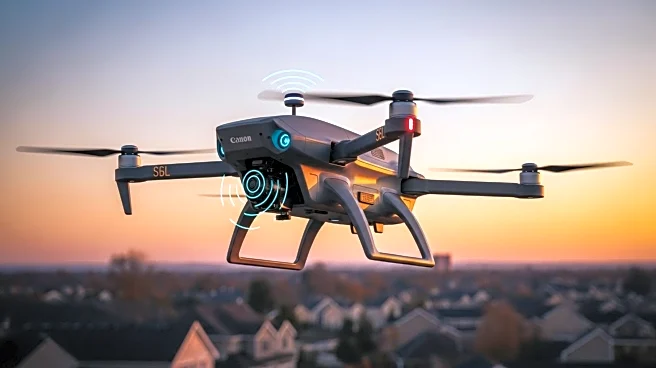What's Happening?
Drone delivery, once a concept confined to science fiction, is now becoming a reality in the U.S. and Europe. Companies like Amazon, DoorDash, and Walmart are integrating drone delivery services into their e-commerce platforms, focusing on ultra-fast, short-range deliveries. These drones operate autonomously, bypassing traffic to deliver packages directly to consumers' homes. Technological advancements in avionics, materials, and autonomy software have enabled drones to move beyond prototypes to commercial viability. Regulatory approvals, particularly FAA Part 135 certifications for Beyond Visual Line of Sight (BVLOS) operations, are accelerating the adoption of drone delivery services. This regulatory shift allows drones to operate without human spotters, making the service scalable.
Why It's Important?
The rise of drone delivery represents a significant shift in logistics, offering potential cost savings and environmental benefits. Drones can deliver packages in under five minutes, meeting the growing consumer demand for rapid fulfillment. Economically, drone delivery is approaching cost parity with traditional delivery methods, avoiding expenses like surge pricing and vehicle maintenance. Environmentally, electric drones offer a sustainable alternative to traditional delivery vehicles, which contribute significantly to urban CO2 emissions. As drone delivery becomes more widespread, it could transform last-mile logistics, making it more efficient and eco-friendly.
What's Next?
As drone delivery gains regulatory approval, companies are likely to expand their operations, testing services in limited geographic areas before scaling. Retailers may assess the return on investment by comparing drone delivery costs with existing methods. Experienced operators with significant commercial flight experience will be crucial as the industry grows. The continued development of drone technology and regulatory frameworks will shape the future of logistics, potentially making drone delivery as commonplace as traditional delivery vans.
Beyond the Headlines
The adoption of drone delivery raises questions about privacy and airspace management, as drones become more prevalent in suburban areas. Ethical considerations regarding surveillance and data collection may arise as drones navigate residential neighborhoods. Additionally, the shift to drone delivery could impact employment in traditional delivery roles, prompting discussions about workforce adaptation and retraining.









